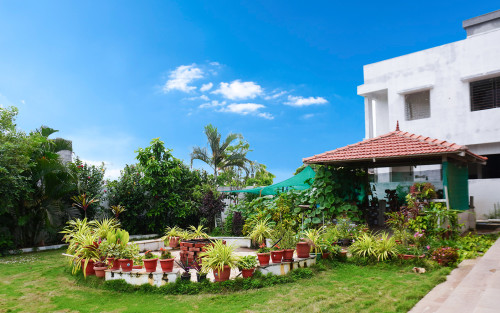



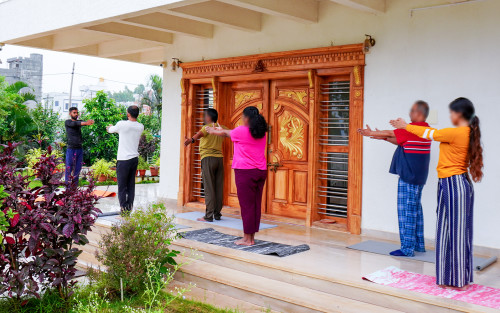




Jagruti Rehabilitation Centre - Bangalore
Verified Center
This provider's information has been quality-checked by Recovery.com's Research Team for accuracy and completeness, including center verification through appropriate third-party organizations.
Treatment Focus
This center treats substance use disorders and mental health conditions. You'll receive individualized care catered to your unique situation and diagnosis, learn practical skills for recovery, and make new connections in a restorative environment.
Primary Level of Care
Offering intensive care with 24/7 monitoring, residential treatment is typically 30 days and can cover multiple levels of care. Length can range from 14 to 90 days typically.
Treatment Focus
This center treats substance use disorders and mental health conditions. You'll receive individualized care catered to your unique situation and diagnosis, learn practical skills for recovery, and make new connections in a restorative environment.
Primary Level of Care
Offering intensive care with 24/7 monitoring, residential treatment is typically 30 days and can cover multiple levels of care. Length can range from 14 to 90 days typically.
Private Pay
You pay directly for treatment out of pocket. This approach can offer enhanced privacy and flexibility, without involving insurance. Exact costs vary based on program and length of stay. Contact the center for specific details.
Jagruti Rehabilitation Centre - Bangalore
Jagruti Rehabilitation Centre - Bangalore
About Jagruti Rehabilitation Centre - Bangalore
For over 18 years, Jagruti Rehabilitation Centre in Bangalore has been a leader in mental health and addiction recovery services, offering a range of treatment options including detoxification, inpatient care, and outpatient programs. With a holistic approach, they specialize in addressing substance abuse, mental health disorders, and behavioral addictions through evidence-based therapies. Their facility features comprehensive care that includes medication management, behavioral therapy programs, and innovative technology-based treatments. Clients benefit from the expertise of a multidisciplinary team of over 30 licensed therapists who foster supportive, non-judgmental environments for healing across various conditions such as depression, anxiety, and addiction.
Find Hope at Jagruti
At Jagruti Rehabilitation Centre, healing goes beyond treating symptoms; it’s about transforming lives within a supportive community. Led by renowned psychiatrist Dr. Amar Shinde, the center offers a unique blend of evidence-based therapies like cognitive behavioral therapy (CBT) and holistic practices. With an impressive 1:2 staff-to-client ratio, each individual receives personalised care tailored to their unique journey. Clients can start their day with mindfulness, followed by heartfelt conversations with compassionate therapists who truly make the effort to understand them. With over 82,000 success stories, Jagruti is making recovery not just possible but a fulfilling promise for those battling addiction and mental health challenges.
Support Services, Unique Offerings
Jagruti Rehabilitation Centre is a haven for people at every stage of life. From young adults figuring out their path to older individuals facing unique mental health challenges, Jagruti customizes care to meet each person’s needs. Their holistic approach shines through with yoga, meditation, and art therapy, giving clients a chance to find peace, express creativity, and rediscover balance. Their treatment is about building connections. Jagruti creates a warm, supportive community where people can share their stories, find understanding, and walk the journey to healing together.
Experience Home Away from Home
Jagruti Rehabilitation Centre in Bangalore offers a supportive environment designed to enhance the recovery journey. The facility provides both private and semi-private rooms, with options for single occupancy featuring amenities like sofas, televisions, and air conditioning, as well as shared accommodations with two or three beds per room, each equipped with a TV. To cater to diverse dietary preferences, the center serves in-house prepared Indian cuisine, with meals scheduled throughout the day and purified drinking water readily available. Clients can engage in various activities, including yoga and meditation, facilitated in dedicated spaces. The center also offers common areas for socialization, promoting a sense of community among residents.

Highlights from the Center
Highlights
These highlights are provided by and paid for by the center.
1-on-1 Counseling
Insurance Accepted
Customized Treatment Plans
Holistic Approach
Center Overview
Treatment Focus
This center treats substance use disorders and mental health conditions. You'll receive individualized care catered to your unique situation and diagnosis, learn practical skills for recovery, and make new connections in a restorative environment.
Jagruti Rehabilitation Centre - Bangalore
Pricing and Program Length
Estimated Center Costs
The cost listed here (₹60,000 to ₹3,00,000/ 30 days), is an estimate of program cost. Center price can vary based on program and length of stay. Contact the center for more information. Recovery.com strives for price transparency so you can make an informed decision.




Recovery.com Verified Listing
Recovery.com verified that the name, location, contact information and license to operate for this treatment provider are valid and up-to-date.
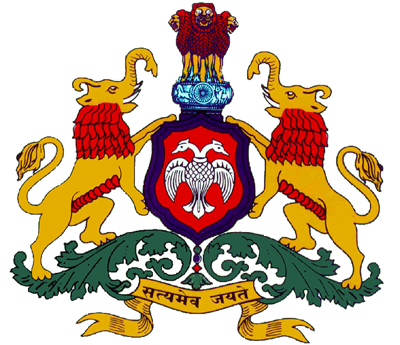
Licensed by State Mental Health Authority Karnataka
Recovery.com is an independent, third-party mental health resource. Verification does not imply endorsement and does not guarantee the quality of treatment services.
Meet Your Care Team

Dr. Darshan Y. J.
Consultant Psychiatrist
MD in Psychiatry

Lilly Pushpa
Nurse
GNM qualification with 6 years of experience in rehabilitation care
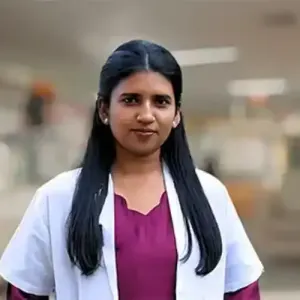
Mariet Varghese
Psychologist
Master’s in Clinical Psychology

Prajna Shreedevi K. H.
Psychiatric
Master's in Social Work
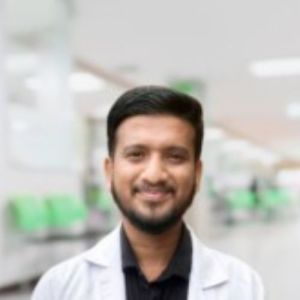
Mithesh M.
Senior Psychologist
Diploma in Health & Social Care (Ireland), and a Diploma in Managerial Psychology (UK)

Aleena E.
Psychiatric
Master’s in Social Work
Your Care Options
Specializations
Schizophrenia
Schizophrenia is a serious mental health condition that causes hallucinations, delusions, and disordered thinking.
Older Adults
Addiction and mental health treatment caters to adults 55+ and the age-specific challenges that can come with recovery, wellness, and overall happiness.
Alcohol
Using alcohol as a coping mechanism, or drinking excessively throughout the week, signals an alcohol use disorder.
Co-Occurring Disorders
A person with multiple mental health diagnoses, such as addiction and depression, has co-occurring disorders also called dual diagnosis.
Depression
Symptoms of depression may include fatigue, a sense of numbness, and loss of interest in activities. This condition can range from mild to severe.
Drug Addiction
Drug addiction is the excessive and repetitive use of substances, despite harmful consequences to a person's life, health, and relationships.
Family Involvement
Providers involve family in the treatment of their loved one through family therapy, visits, or both–because addiction is a family disease.
Trauma
Some traumatic events are so disturbing that they cause long-term mental health problems. Those ongoing issues can also be referred to as "trauma."
Who We Treat
Older Adults
Addiction and mental health treatment caters to adults 55+ and the age-specific challenges that can come with recovery, wellness, and overall happiness.
Adolescents
Teens receive the treatment they need for mental health disorders and addiction, with the added support of educational and vocational services.
Children
Treatment for children incorporates the psychiatric care they need and education, often led by on-site teachers to keep children on track with school.
Young Adults
Emerging adults ages 18-25 receive treatment catered to the unique challenges of early adulthood, like college, risky behaviors, and vocational struggles.
LGBTQ+
Addiction and mental illnesses in the LGBTQ+ community must be treated with an affirming, safe, and relevant approach, which many centers provide.
Men and Women
Men and women attend treatment for addiction in a co-ed setting, going to therapy groups together to share experiences, struggles, and successes.
Treatment Services
Day Treatment
In a PHP, patients live at home but follow an intensive schedule of treatment. Most programs require you to be on-site for about 40 hours per week.
Detox
Detox fully and safely removes toxic substances from the body, allowing the next steps in treatment to begin with a clean slate.
Intensive Outpatient Program
In an IOP, patients live at home or a sober living, but attend treatment typically 9-15 hours a week. Most programs include talk therapy, support groups, and other methods.
Licensed Primary Mental Health
Some primary care providers offer mental health diagnosis and treatment. This can prevent patients from developing more serious conditions.
Outpatient
During outpatient rehab, patients attend a structured treatment program while continuing to live at home.
Residential
In a residential rehab program, patients live onsite, with access to daily treatment and 24-hour care. An average stay is 30-90 days.
Approaches
Evidence-Based
A combination of scientifically rooted therapies and treatments make up evidence-based care, defined by their measured and proven results.
Holistic
A non-medicinal, wellness-focused approach that aims to align the mind, body, and spirit for deep and lasting healing.
Individual Treatment
Individual care meets the needs of each patient, using personalized treatment to provide them the most relevant care and greatest chance of success.
Twelve Step
Incorporating spirituality, community, and responsibility, 12-Step philosophies prioritize the guidance of a Higher Power and a continuation of 12-Step practices.
Wellness
Wellness philosophies focus on the physical, mental, and spiritual wellness of each patient, helping them restore purpose with natural remedies.
Therapies
1-on-1 Counseling
Patient and therapist meet 1-on-1 to work through difficult emotions and behavioral challenges in a personal, private setting.
Meditation & Mindfulness
A practiced state of mind that brings patients to the present. It allows them to become fully aware of themselves, their feelings, and the present moment.
Play Therapy
This approach is commonly used with children. It incorporates elements of play and self-expression, like boardgames, finger painting, dolls, and blocks.
Trauma-Specific Therapy
This form of talk therapy addresses any childhood trauma at the root of a patient's current diagnosis.
Rational Emotive Behavior Therapy
A type of cognitive therapy that identifies negative self-defeating thoughts and behaviors, rewriting beliefs to be positive, empowering, and present.
Attachment-Based Family Therapy
ABFT is a trauma-focused therapy that teaches you to form healthy relationships by rebuilding trust and healing attachment issues formed in childhood.
Art Therapy
Visual art invites patients to examine the emotions within their work, focusing on the process of creativity and its gentle therapeutic power.
Ayurveda
One of the oldest medicine systems, Ayurveda is based on the idea that wellness lies in the mind-body-spirit balance and can be achieved through natural interventions.
Conditions We Treat
Pornography Addiction
A person with a porn addiction is emotionally dependent on pornography to the point that it interferes with their daily life and relationships.
Schizophrenia
Schizophrenia is a serious mental health condition that causes hallucinations, delusions, and disordered thinking.
Grief and Loss
Grief is a natural reaction to loss, but severe grief can interfere with your ability to function. You can get treatment for this condition.
Personality Disorders
Personality disorders destabilize the way a person thinks, feels, and behaves. If untreated, they can undermine relationships and lead to severe distress.
Anger
Although anger itself isn't a disorder, it can get out of hand. If this feeling interferes with your relationships and daily functioning, treatment can help.
Anxiety
Anxiety is a common mental health condition that can include excessive worry, panic attacks, physical tension, and increased blood pressure.
Bipolar
This mental health condition is characterized by extreme mood swings between depression, mania, and remission.
Depression
Symptoms of depression may include fatigue, a sense of numbness, and loss of interest in activities. This condition can range from mild to severe.
Obsessive Compulsive Disorder (OCD)
OCD is characterized by intrusive and distressing thoughts that drive repetitive behaviors. This pattern disrupts daily life and relationships.
Substances We Treat
Alcohol
Using alcohol as a coping mechanism, or drinking excessively throughout the week, signals an alcohol use disorder.
Benzodiazepines
Benzodiazepines are prescribed to treat anxiety and sleep issues. They are highly habit forming, and their abuse can cause mood changes and poor judgement.
Co-Occurring Disorders
A person with multiple mental health diagnoses, such as addiction and depression, has co-occurring disorders also called dual diagnosis.
Cocaine
Cocaine is a stimulant with euphoric effects. Agitation, muscle ticks, psychosis, and heart issues are common symptoms of cocaine abuse.
Drug Addiction
Drug addiction is the excessive and repetitive use of substances, despite harmful consequences to a person's life, health, and relationships.
Ecstasy
Ecstasy is a stimulant that causes intense euphoria and heightened awareness. Abuse of this drug can trigger depression, insomnia, and memory problems.
Heroin
Heroin is a highly addictive and illegal opioid. It can cause insomnia, collapsed veins, heart issues, and additional mental health issues.
Psychedelics
Hallucinogenic drugs—like LSD—cause euphoria and increased sensory experiences. When abused, they can lead to depression and psychosis.
Methamphetamine
Methamphetamine, or meth, increases energy, agitation, and paranoia. Long-term use can result in severe physical and mental health issues.
Languages
Aftercare
Care Designed for Your Needs
Personal Amenities
Amenities
Activities
Yoga
Yoga is both a physical and spiritual practice. It includes a flow of movement, breathing techniques, and meditation.
Learn More About the Center
Feelings Depressed or Hopeless?
Discover insightful strategies and personal stories that can inspire hope.
Dealing with Anger Recovery
Explore effective techniques and expert insights to help manage anger.
Right time for Psychiatric Help
Learn to recognize the signs that indicate it’s time to seek help.
Effective Treatment for Inpatient Alcohol Treatment
Discover the various evidence-based treatment methods available for inpatient alcohol rehab.
What people are saying
Treatment
5.0
Accommodations
5.0
Food & Nutrition
5.0
Value
5.0
Pros
- Beautiful Location (2)
- Supportive Aftercare (2)
Renu
Treatment in 2022 • (60 days) • Reviewed 04/11/25
Loved One of a Former Client
•Bangalore
Ashima
Treatment in 2023 • (90 days) • Reviewed 04/09/25
Former Client
•Manager
•Bidar





